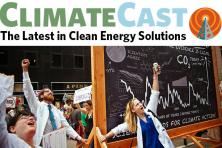The tide is turning against fossil fuels
California has met its goal of reducing emissions down to 1990 levels a full four years ahead of schedule. Governor Jerry Brown applauded the results, saying they showed California can fight climate change while still enjoying a significant economic boom. Across the pond, Ireland passed a law declaring its intent to divest its national investment fund from coal, oil, gas and peat companies, making it the first country in the world to divest from fossil fuels. One of the world’s biggest insurance companies, Swiss Re, will no longer insure companies with 30 percent of their revenue or power from coal. The Church of England, whose investment portfolio is worth about $16 billion, will withdraw investments from firms that do not meet terms of the Paris Climate Agreement by 2023.
The climate impacts of this American Presidency
The actions of America's unpredictable President continue to portend grave consequences for climate progress worldwide. Reflecting on this week's summit with Vladimir Putin, Eric Holthaus notes that "there’s no way to understand Trump’s relationship with Russia without putting oil and climate politics at its center."
Meanwhile, climate advocates warn that Senate confirmation of Trump's nominee Brett Kavanaugh as an associate justice of the Supreme Court could have a sharply negative environmental impact. Kavanaugh has been a frequent opponent of the EPA, and it is believed he would work to significantly weaken the agency’s regulatory authority. Senior counsel for the Center for Biological Diversity, Professor Bill Snape, stated that “he is pretty consistently anti-environment on every front. I call him Lord Voldemort." A conservative court could eliminate the Clean Power Plan and also overturn Mass. vs. EPA, a ruling that compelled the EPA to regulate greenhouse gases as pollutants under the Clean Air Act.
Good riddance to bad rubbish: Scott Pruitt resigns
After more than a dozen ethics scandals, Scott Pruitt finally resigned as director of the EPA. Many are left wondering if Pruitt was successful in his aim to remake the EPA. While the long term impacts of Pruitt’s tenure have yet to be seen, Pruitt did oversee one major destructive decision on his final day: the EPA approved a loophole allowing for an increase in the manufacturing of diesel freight trucks that produce as much as 55 times the air pollution as trucks with modern emissions controls. Pruitt also completely eliminated funding for the Office of Environmental Justice, laying the foundation for an EPA that ignores marginalized communities struggling with the adverse impacts of dirty air, water, and other environmental pollution.
EPA’s new acting director Andrew Wheeler is a former coal lobbyist who most recently represented a major mining company and helped draft a detailed a list of policies aimed at reviving the coal industry. He previously served as a longtime staffer for Senator Jim Inhofe, who many remember for bringing a snowball onto the Senate floor to deny the existence of climate change. Experts anticipate that Wheeler will be more successful than Pruitt at rolling back environmental regulations due to his extensive experience in Washington D.C.
Wind is expanding, but solar is slumping in the U.S. due to tariffs
Sweden has installed so much wind energy that the country is expected to meet its 2030 renewable energy target this year, 12 years early. Global investments in wind power surged during the first half of 2018. In New York, new rules will help streamline the environmental review process for some solar projects, making it easier to install solar in landfills, cleaned-up brownfields, rooftops, and other places impacted by human presence. On the flip side, solar investment is down nearly 20 percent from the first half of 2017. Trump’s solar tariffs are already having a notable impact on the industry, from sales, to project timelines, and employment. This article explores just how new tariffs are affecting specific companies.
Climate change felt viscerally, one heatwave at a time
A new survey shows that high temperatures are finally causing more Americans to accept that humans are responsible for causing climate change. A long-running survey of American attitudes to climate change found that 73 percent of people now understand that there is solid evidence of global warming, while 60 percent believe that warming is due, at least in part, to humans.
From the U.S. to Ireland to the Middle East, countries across the globe have recorded their hottest weather ever this month. In Phoenix, Arizona, heat-related deaths are on the rise: 155 people died from heat-related causes last year, and the city’s former mayor has deemed heat-related deaths a public health crisis. In Quebec, Canada, as many as 70 people died this month from heat-related complications. A heat wave in California caused temperatures to reach as high as 117 degrees. Compounding these dangerously hot days, heat now lingers overnight, preventing homes and other buildings from cooling down at night. Temperature rises due to global warming could eventually be double what some climate models project, according to an international team of researchers from 17 countries.
In Brief: Three steps to better climate conversations
Climate scientist and communicator, Dr. Katharine Hayhoe, offers a three-part formula for facilitating relevant, constructive, and hopeful talk to create a common ground on climate. She provides insights on how to talk to each other about climate change in a way that inspires rather than causing us to feel overwhelmed or emotionally shut down.




